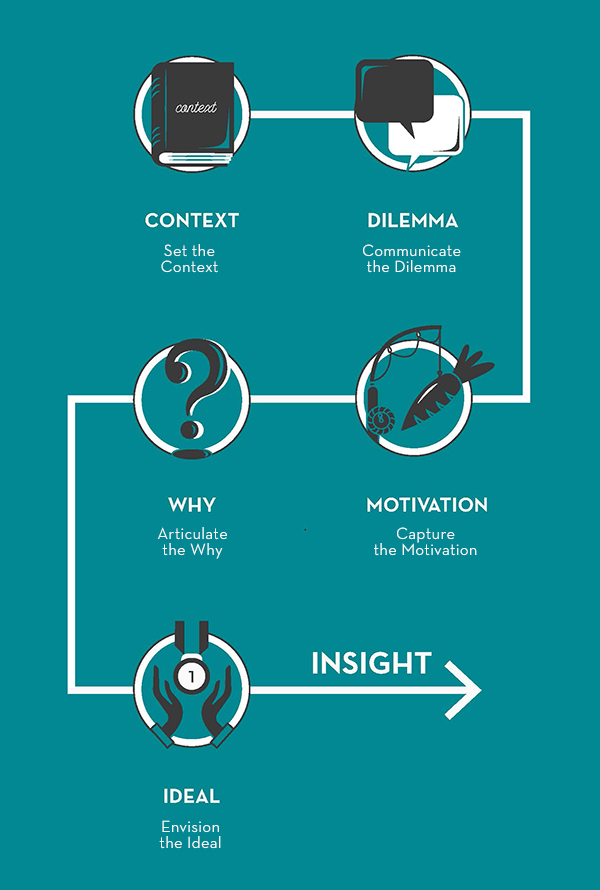mirror of
https://github.com/Sevichecc/Urara-Blog.git
synced 2025-04-30 16:39:30 +08:00
154 lines
6.4 KiB
Markdown
154 lines
6.4 KiB
Markdown
---
|
||
title: 什么是设计洞察 · What is Insight
|
||
created: 2021-10-15T15:07:14.533Z
|
||
tags:
|
||
- Design Thinking
|
||
- 翻译
|
||
keywords:
|
||
- insight
|
||
---
|
||
|
||
原文: [thrivethinking.com](https://thrivethinking.com/2016/03/28/what-is-insight-definition/)
|
||
|
||
## insight 不是什么
|
||
|
||
- 不是数据
|
||
- 不是简单的事实观测
|
||
- 不是用户的需求陈述(例如: 我需要、我想要)
|
||
|
||
## 是什么
|
||
|
||
1. 是揭示本质的
|
||
|
||
> An unrecognized fundamental human truth that reveals the inner nature of things
|
||
>
|
||
> 一个未被承认的人类基本真理,揭示了事物的内在本质
|
||
|
||
2. 是一种看待世界的新方式
|
||
|
||
> A new way of viewing the world that causes us to reexamine existing conventions and challenge the status quo.
|
||
>
|
||
> 一种看待世界的新方式,使我们重新审视现有的惯例并挑战现状
|
||
|
||
3. 是对人类行为的深入观察
|
||
|
||
> A penetrating observation about human behavior thaWhat Is Insight- The 5 Principles of Insight Definitiont results in seeing consumers from a fresh perspective.
|
||
>
|
||
> 对人类行为的深入观察,导致从一个全新的角度看待消费者。
|
||
|
||
4. 是一种对人们潜在行为的发现
|
||
|
||
> A discovery about the underlying motivations that drive people’s actions.
|
||
>
|
||
> 对驱动人们行动的潜在动机的发现。
|
||
|
||
**洞察(Insight)让我们去思考人们为什么做事,是什么阻碍了人们做事情,它更深入问题根源,而不是停留在表面**
|
||
|
||
## 五大要素
|
||
|
||
**语境/困境/动机/原因/设想**
|
||
[](http://thrivethinking.com/wp-content/uploads/2016/03/WhatIsInsight_5.jpg)
|
||
|
||
## 定义 Insight 的步骤
|
||
|
||
### 1.设定语境/场景
|
||
|
||
> A simple observation of how people behave in a given situation, what they think, what they feel, but most importantly explain what they are doing and trying to achieve
|
||
>
|
||
> 一个关于人们在给定的情境内如何想、如何做、如何感受的观察陈述。重要的是要说明他们在做什么以及想做什么。
|
||
|
||
### 2.沟通困境
|
||
|
||
> understanding the barriers that are stopping consumers from achieving what they want to achieve with a given product, service or experience
|
||
>
|
||
> 了解消费者通过特定产品、服务或体验实现其愿望时遇到的障碍。
|
||
|
||
### 3. 阐明原因
|
||
|
||
> An insight statement is a discovery of understanding and the identification of unmet needs to explain why something is happening the way it is
|
||
>
|
||
> 洞察力声明是对理解的发现和对未满足需求的识别,以解释为什么事情会以这样的方式发生.
|
||
|
||
> You must know the reason a consumer is behaving in a particular way, and why it is happening if you are to develop a product or service that can in some way augment the behavior or change it.
|
||
>
|
||
> 你必须知道消费者以特定方式行事的原因,以及为什么会发生这种情况,如果你要开发一种产品或服务,以某种方式增强这种行为或改变它的话。
|
||
|
||
### 4. 捕捉动机
|
||
|
||
> Discovering the underlying motivations that drive people’s actions
|
||
>
|
||
> 发现推动人们行动的潜在动机
|
||
|
||
> End-users of a product or service are motivated to change by the tensions that exist in their lives.
|
||
>
|
||
> 产品或服务的终端用户被他们生活中存在的紧张关系所激励而改变
|
||
|
||
> Look for tensions in four key areas: the physiological, the emotional, the cognitive and the environmental to inform your insight statements.
|
||
>
|
||
> 寻找四个关键领域的紧张关系:生理的、情感的、认知的和环境的,
|
||
|
||
### 5.构想理想
|
||
|
||
> It is important to describe the desired end-state or situation the consumer is seeking.
|
||
>
|
||
> 描述消费者所追求的理想的最终状态或情况是很重要的
|
||
|
||
> The key here is not to define a solution but clearly convey how the consumer would like the world to look and feel, what the ideal experience should be.
|
||
>
|
||
> 此处的关键在于不需要定义一个清晰的解决方案,而需要清楚地传达消费者希望世界看起来和感觉如何,理想的体验应该是什么
|
||
|
||
> An excellent way to articulate this is to start with the statement “I wish there was,
|
||
>
|
||
> 一个很好的表达方式是以 "我希望有 "开始
|
||
|
||
## 如何表达
|
||
|
||
> Think of insight definition as a three sentence journey that takes the reader through the consumer’s situation, frustration, and future desires.
|
||
>
|
||
> 将洞察定义视为一个三句话的旅程,带领读者了解消费者的情况、挫折和未来的愿望。
|
||
|
||
### 第一句话——描述现状和用户行为。
|
||
|
||
> **_Having pictures around that instantly remind me of special moments and people, makes me feel good.”_**
|
||
>
|
||
> "身边有照片,能让我立即想起特别的时刻和人物,让我感觉很好。"
|
||
|
||
### 第二句话——描述用户的困境,并说明造成困境的原因。
|
||
|
||
> **_“But I find that pictures from my digital camera often stay hidden on my devices because I never have time to print them.”_**
|
||
>
|
||
> "但是我发现我的数码相机里的照片经常被藏在我的设备里,因为我从来没有时间去打印它们。"
|
||
|
||
### 第三句话——描述用户期望的最终理想状况。
|
||
|
||
> **_“I wish there was a way to enjoy them everyday without having to actively play them on my TV or computer.”_**
|
||
>
|
||
> "我希望有一种方法可以每天欣赏它们,而不必在电视或电脑上主动播放它们。"
|
||
|
||
### Tips
|
||
|
||
- 用第一视角书写
|
||
- 真实、人性化的口吻
|
||
- 客观、真诚
|
||
|
||
## 什么是一个好的'Insight'
|
||
|
||
- 它在情感层面与消费者建立联系,并引起 "你显然理解我 "的反应。
|
||
- 它重新审视现有的惯例并挑战现状。
|
||
- 它解决了一个真正的问题,从而产生了新的客户。
|
||
- 它通过给你一个明确的目标来激发行动。
|
||
- 它清楚地说明了下一步该做什么以及如何为你的客户提供价值。
|
||
- 它为团队带来了新的感知水平,并有助于做出明智的决策。
|
||
|
||
## Insight->How Might We?
|
||
|
||
需要把 insight(洞察)转变为 HMW(我们如何?)
|
||
|
||
例如:
|
||
|
||
> "我们可能如何每天享受我们的记忆,而不必花时间在设备上主动播放它们?"
|
||
|
||
## 后记
|
||
|
||
- insight 在作品集中如何表达?看到有 Insight 只写一句话的,总结为'Key insights',内容上是关键的事实发现,而跟前文所述的这种深入的洞察不同,那是否存在两种 insight 的定义写法?
|
||
- 打算把 Insight 放到 Persona 后面,一个 Persona 对应一个 insight 和一个 How Might We.
|